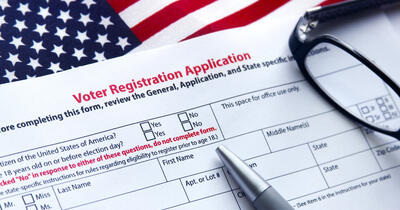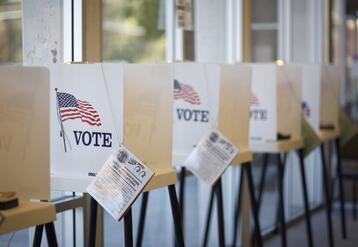
Strengthening the Right to Vote: How Biden's Executive Order Can Ease Access to the Ballot
In the midst of extreme efforts to undermine our democracy we need our government to take urgent action to protect and promote the fundamental right to vote

Today is National Voter Registration Day. This year, this important day comes in the midst of extreme efforts to undermine our democracy in states across the country. These anti-democratic efforts—led by opponents of a multiracial, inclusive democracy and economy—are intentionally designed to diminish the power of Black and brown voters, low-income voters, and others who have long been the targets of discrimination and exclusion. Organizers and activists are fighting to counter those efforts, including by registering thousands of voters during National Voter Registration Day and Month. In addition to making our voting rolls complete and more accurate, this herculean work strengthens our democracy by expanding the electorate and ensuring no eligible person is prevented from voting because they are not registered. But organizers will be the first to tell you: you can’t out-organize voter suppression.
That’s why we need our government to take urgent action to protect and promote the fundamental right to vote.
That’s why we need our government to take urgent action to protect and promote the fundamental right to vote. As President Biden himself said in his March 2021 Executive Order on Promoting Access to Voting (EO), “It is the responsibility of the Federal Government to expand access to, and education about, voter registration and election information, and to combat misinformation, in order to enable all eligible Americans to participate in our democracy.” The Biden administration and federal agencies can meet that responsibility through strong implementation of the EO, which directs federal agencies to consider what they can do to promote access to registration and voting. If executed well, this EO could help millions of Americans get and stay registered to vote.
We’ve written about the opportunity created by this EO, promising early steps from agencies, and the significant potential that remains untapped. So, this National Voter Registration Day, we’ve invited our colleagues and partners to share why swift follow-through on the EO is so important to them, and what meaningful, timely action from the federal agencies can mean for their communities and for our democracy.
In this series, you’ll hear from a number of folks who are deep in the trenches fighting for justice in their communities and for the right to vote, including:
- Sharné Haywood, Senior Policy Specialist at Planned Parenthood and leader within the reproductive rights movement, on the threats to democracy posted by state legislatures and courts, why the pursuit of access to abortion and healthy communities is inextricably tied to a strong democracy, and why the Biden Administration must integrate voter registration into healthcare.gov. Read Sharné's blog here.
- A tribal leader on the unique challenges facing voters in Indian Country, on why the designation of Haskell Indian Nations and the Southwestern Indian Polytechnic Institute as voter registration agencies under the NVRA is so significant, and why Indian Health Services must offer meaningful voter registration services to their patients.
- Kira Romero-Craft, Director of Legal Strategies here at Demos, on her experience becoming a U.S. citizen and why U.S. Citizenship and Immigration Services must improve its voter registration offerings at naturalization ceremonies.
- Ashley Tjhung, Demos’ Policy Analyst for Democracy Reform, on the barriers to voting that young people face, and what several agencies can do to promote civic engagement among young voters.
- Staff from Paralyzed Veterans of America National Headquarters on voting as a veteran and why the Dept. of Veterans Affairs’ commitment to designate VA Medical Centers across a handful of states as voter registration sites could be transformative.
We hope you enjoy hearing from our colleagues and partners over the next few weeks. We’ll be back at the end to recap and to remind you what can be done to help make these authors’ calls to action a reality.






